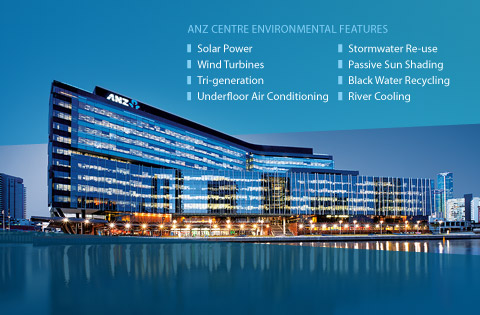Our growth strategy focuses on urban markets in Asia where our customers and local communities face congestion, air quality and sanitation challenges, particularly as populations grow.
In this context, we seek to better understand the social and environmental pressures on cities where we operate, and identify how we can help to improve environmental and social sustainability.
ANZ Centre was named the Commercial Building of the Year in the prestigious Leading European Architects Forum (LEAF) Awards for 2010.
“ANZ Centre will set a global environmental and social sustainability benchmark for others to follow.”
LEAF AWARDS – JUDGES COMMENTS
Sharing our Knowledge for Better Buildings
ANZ Centre, our new global headquarters in Melbourne is creating a lasting impression, not just on the environment, but also on the 6,500 staff who work there.
The ANZ Centre was designed to be one of the most environmentally progressive buildings and has since been awarded the ‘6 Star Green Star’ Design rating from the Green Building Council of Australia.
It is also attracting significant interest from builders, architects, governments, and educators with hundreds of people visiting the Centre in the past year to learn more about these features and how they can implement similar initiatives in their own properties.
Designed to produce 70% less greenhouse gas (GHG) emissions than a standard commercial office building, ANZ Centre’s environmental features include the use of under floor air distribution, river cooling, on-site generation of electricity using natural gas, wind and solar energy and black water recycling.
It also includes innovative features to support the health and wellbeing of our staff, including:
- flexible work zones, allowing staff space to work either collaboratively or individually as required;
- floor-to-ceiling glazing and central atriums ensuring maximum use of natural light;
- under floor air distribution system, enabling 90% fresh air intake, which far exceeds Australian building standards;
- over 500 bicycle spaces with easy access to bike paths for staff who wish to reduce the environmental impact of their travel to work; and
- a wellness centre offering a range of fitness, health and wellbeing programs.
Investing in a Renewable Energy Future
Around $20 billion in renewable energy investment will be needed over the next 10 years to meet Australia’s target of having 20% of its electricity generated from renewable sources by 2020.
Today, ANZ is a leading renewable energy financier – representing around 30% of our project finance energy sector lending portfolio. Our involvement has grown steadily over time, in line with increasing demand.
ANZ’s current wind portfolio extends to some 1,145MW – enough renewable power to supply around 630,000 homes spread across 14 projects, of which over 80% are in Australia.
We financed Australia’s first renewable energy project in 1992, providing project finance for Energy Developments BioEnergy landfill gas projects in Victoria. We also financed New South Wales’ and Australia’s first completed wind farm at Challicum Hills in 2002.
For 2011, we have set a public goal to implement products and services to assist clients and customers with the transition towards a lower carbon economy and will continue to increase the proportion of lending to the renewable energy sector.
Implementing our Commitment to Carbon Neutrality
ANZ will achieve its commitment to become carbon neutral across our business globally at the end 2010 by purchasing a range of international carbon offsets.
Our commitment to carbon neutrality is aligned with the Australian Government’s National Carbon Offset Standard (NCOS), a voluntary framework that provides accreditation for companies to become carbon neutral.
ANZ’s carbon inventory will include a number of additional emissions beyond the NCOS standards, such as hotel accommodation, print paper, road transport and transmission losses.
Programs are in place to measure, reduce and offset our emissions associated not only with premises energy but also with air travel, accommodation and taxis, given the travel associated with our growing regional footprint.
We also continue to focus on reducing our travel emissions by promoting alternatives such as advanced video conferencing technology to communicate between our key offices.
A carbon management services provider has been appointed and is undertaking portfolio selection, detailed project assessment and evaluation of benefits.
Consistent with ANZ’s super regional strategy, the projects supported by ANZ’s carbon offsets will be primarily based in developing countries where we have a presence such as India, China, Cambodia, Thailand and Indonesia.
Our original timeframe to achieve carbon neutrality was delayed late last year due to a reshaping of our business and regulatory developments in Australia. However, the commitment will be applied retrospectively from 1 October 2009, thereby achieving our original target.
Key Goals We Set Out To Achieve In 2010
| KEY GOALS WE SET OUT TO ACHIEVE IN 2010 | PERFORMANCE |
|---|---|
| Implement our carbon neutral strategy and become carbon neutral globally in line with the Australian Government's National Carbon Offset Standard. |
 |
| Work towards achieving our two-year environmental goals in Australia and New Zealand: |
 |
| – Absolute reduction in GHG: -6% AUS / -2% NZ |
 |
| – Premises energy per FTE: -6% AUS / -2.5% NZ |
 |
| – Paper consumed per FTE: -10% AUS / -10% NZ |
 |
| – Water use per FTE: -10% AUS / Baseline NZ |
 |
| – Waste recycled: +10% (AUS) +10% (NZ) |
 |
| Review our Environmental Management System (EMS) for implementation across our key markets. |
 |
-

Achieved or on track to achieve
-

Partially achieved or in progress
-

Did not achieve

